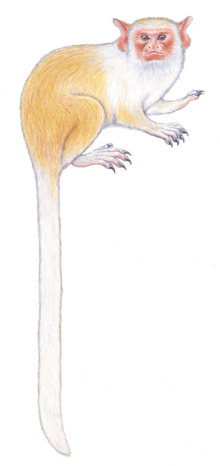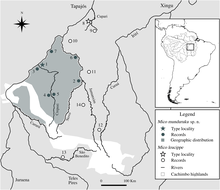Munduruku marmoset
The Munduruku marmoset (Mico munduruku) is a marmoset endemic to Brazil. It is found only in the southern Amazon, in an area of approximately 120,000 km², from the right bank of the Jamanxim River, below the mouth of the Rio Novo, to the mouth of the Tapajós River, below the mouth of the Cururu River. According to researcher and discoverer Rodrigo Araújo, approximately half of the distribution area lies within Mundurucu Indigenous Territory in the Amazonas state. The name sagui-dos-Munduruku is a tribute to the Munduruku Indians and refers to the geographical distribution of the species.[1][2]
| Munduruku marmoset | |
|---|---|
 | |
| Scientific classification | |
| Kingdom: | Animalia |
| Phylum: | Chordata |
| Class: | Mammalia |
| Order: | Primates |
| Suborder: | Haplorhini |
| Infraorder: | Simiiformes |
| Family: | Callitrichidae |
| Genus: | Mico |
| Species: | M. munduruku |
| Binomial name | |
| Mico munduruku Costa-Araújo, Farias & Hrbek, 2019 | |
 | |
| Distribution in dark blue-grey | |
Sources
- Munduruku, Peerj, retrieved 2019-08-01
- Costa-Araújo, R.; De Melo, F. R.; Canale, G. R.; Hernández-Rangel, S. M.; Messias, M. R.; Rossi, R. V.; Silva, F. E.; Da Silva, M. N.; Nash, S. D.; Boubli, J. P.; Farias, I. P.; Hrbek, T. (2019), "Munduruku", PeerJ, Ncbi, 7: e7019, doi:10.7717/peerj.7019, PMC 6661146, PMID 31380146
- Munduruku, Researchgate, retrieved 2019-08-01
- Sagui-dos-Munduruku (in Portuguese), G1, retrieved 2019-08-01
- Sagui-dos-Munduruku, International Primatological Society, retrieved 2019-08-01
gollark: It's an interesting idea.
gollark: [REDACTED]
gollark: They would be MORE isolated.
gollark: Who says this didn't already happen?
gollark: This way is faster.
References
| Wikispecies has information related to Munduruku Marmoset |
| Wikimedia Commons has media related to Mundukuru Marmoset. |
- Hrbek, Tomas; Farias, Izeni Pires; Boubli, Jean P.; Nash, Stephen D.; Silva, Maria Nazareth Ferreira da; Silva, Felipe E.; Rossi, Rogério Vieira; Messias, Mariluce Rezende; Hernández-Rangel, Sandra M. (2019-07-25). "The Munduruku marmoset: a new monkey species from southern Amazonia". PeerJ. 7: e7019. doi:10.7717/peerj.7019. ISSN 2167-8359. PMC 6661146. PMID 31380146.
- "new monkey ..." www.newscientist.com. Retrieved 2019-08-04.
This article is issued from Wikipedia. The text is licensed under Creative Commons - Attribution - Sharealike. Additional terms may apply for the media files.
